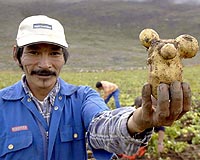| . |  |
. |
Ilulissat, Greenland (AFP) July 9, 2009 One of the world's largest glaciers, on the west coast of Greenland, is shrinking at an alarming rate as a result of global warming -- with potentially dire consequences. Ilulissat, a UNESCO-listed glacier, is shedding ice into the sea faster than ever before, according to one of Denmark's top experts on glaciology. Andreas Peter Ahlstroem, a researcher with the Geological Survey of Denmark and Greenland institute, told AFP that the glacier has receded by more than 15 kilometres (10 miles) since 2001. "Its calving rate (breaking off of ice) has never been so rapid," he said. The Ilulissat glacier and icefjord have been on UNESCO's world heritage list since 2004 and is the most visited site in Greenland, its ice and pools of emerald-blue water admired by tourists and studied by scientists and politicians around the world. The Danish government chose Ilulissat as the venue for recent talks with some 30 countries to discuss ways to slow global warming -- a place that Shfaqat Abbas Khan, a glacier expert from the Danish Space Centre, describes as the "most visible and striking example of climate change." The glacier is the most active in the northern hemisphere, producing 85 million tonnes of icebergs per day, according to Khan. He has been studying Ilulissat using satellites, GPS or through his own visits to the area and says December's UN climate change conference in the Danish capital of Copenhagen may come too late to save the glacier. "A lot of glaciers in Greenland are melting at more or less the same pace and even with an ambitious agreement at the summit ... it will be impossible to stop this," Khan said. The melting ice is both a consequence and a cause of global warming: ice reflects heat, as opposed to water which absorbs it and warms up the climate, thus causing more glaciers and snow to melt. Khan explained that Ilulissat is losing more than 30 cubic kilometres (seven cubic miles) of ice a year, compared to 10 cubic kilometres in 2000 and just five in 1992. "We should aim to at least reduce CO2 emissions and limit the damage done," he said. A panel of UN scientists estimates that if the polar ice caps continue to melt at their current rate, sea levels could rise by between 18 and 59 centimetres (seven and 24 inches) by 2100, But Khan says these calculations do not take into account the melting of Greenland's glaciers. "In fact, if this thawing that we see ... was to spread across the whole island, the sea level would rise between one metre and 1.5 metres by the end of the century," he told AFP. Greenland's glacial ice cap, which spans 1.7 million square kilometres, is not as stable as the panel suggests, he said. "It sheds much more ice in summer than it gets from the winter snow," Khan said. His fellow glacier expert, Ahlstroem from the Geological Survey of Denmark and Greenland, warned that the Ilulissat glacier could recede even further and faster. "The question is: what would happen if the warmer waters of the fjord were to filter through the glacier and further speed up the thawing process?" he asked. Share This Article With Planet Earth
Related Links Climate Science News - Modeling, Mitigation Adaptation
 Global warming impacting Greenlanders' daily lives
Global warming impacting Greenlanders' daily livesNuuk (AFP) July 9, 2009 From his trawler that motors along the Nuuk fjord, fisherman Johannes Heilmann has watched helplessly in recent years as climate change takes its toll on Greenland. Global warming is occurring twice as fast in the Arctic as in the rest of the world. Heilmann, in his 60s with a craggy, rugged face from years of work in the outdoors, says he and his colleagues can no longer take their dogs ... read more |
|
| The content herein, unless otherwise known to be public domain, are Copyright 1995-2009 - SpaceDaily. AFP and UPI Wire Stories are copyright Agence France-Presse and United Press International. ESA Portal Reports are copyright European Space Agency. All NASA sourced material is public domain. Additional copyrights may apply in whole or part to other bona fide parties. Advertising does not imply endorsement,agreement or approval of any opinions, statements or information provided by SpaceDaily on any Web page published or hosted by SpaceDaily. Privacy Statement |